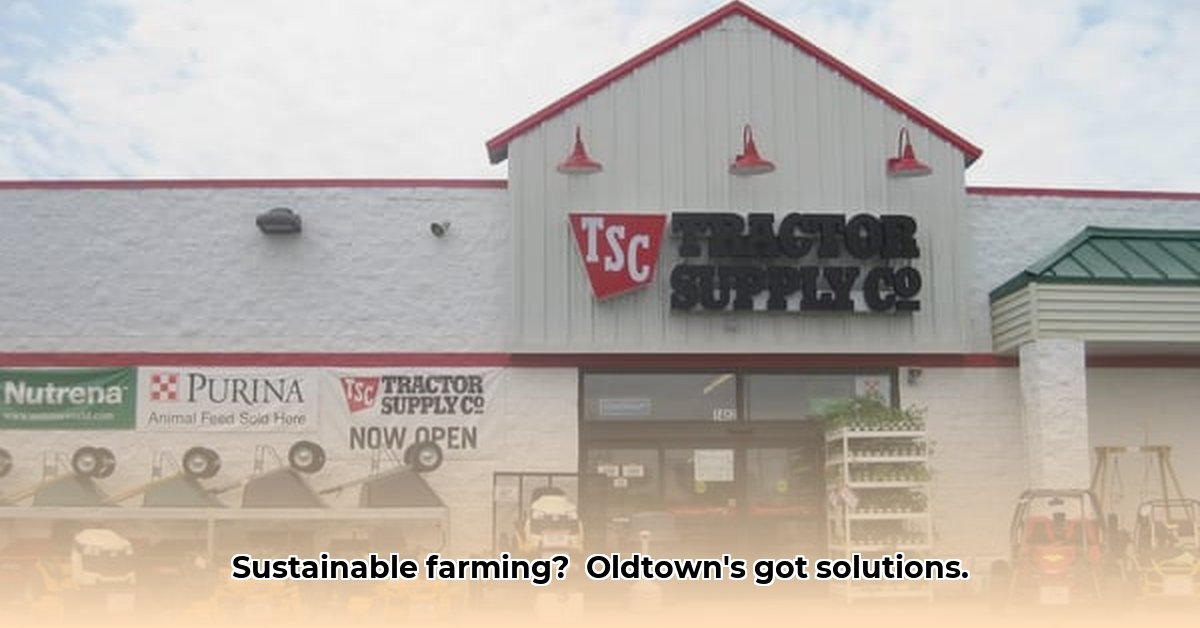
Tractor Supply Company (TSC) in Oldtown, Idaho, serves as a vital resource for local farmers and gardeners. But beyond providing essential tools and supplies, how effectively does it support sustainable agriculture? This article delves into TSC's role in Oldtown's agricultural landscape, analyzing its sustainable product offerings, evaluating its environmental initiatives, and outlining opportunities for improvement. We’ll explore how consumers can make informed choices and contribute to a more sustainable future for Oldtown's farming community. For more information on TSC's veterinary services, visit this page.
Tractor Supply's Footprint in Oldtown's Agricultural Ecosystem
TSC's Oldtown location acts as a central hub for agricultural needs, providing everything from animal feed and fencing to gardening tools and equipment. This accessibility is vital, but the true measure of its contribution lies in its commitment to sustainable practices. Does the store prioritize locally sourced, environmentally friendly products? Is transparent information readily available to consumers seeking eco-conscious options? These questions are critical to understanding the store's overall impact.
Assessing TSC's Sustainable Product Portfolio
While TSC offers a wide range of products relevant to sustainable agriculture – such as organic seeds, natural pest control options, and durable tools – a significant challenge lies in the lack of consistent and readily accessible information about their sourcing and environmental impact. How many of their products are certified organic? What percentage of their animal feed utilizes sustainably sourced ingredients? The absence of this critical detail hinders informed consumer choices. The availability of compostable seed starting containers and organic fertilizers represents a positive step, but this needs to be a systemic approach rather than isolated selections.
Examining TSC's Sustainability Efforts: A Critical Review
Currently, TSC's publicly available information on sustainability initiatives is limited. Their website provides general information but lacks the granular detail crucial for consumers seeking transparency. The absence of clear information on sourcing practices (e.g., animal feed, lumber for fencing) and efforts to minimize environmental impact raises concerns about the company's commitment to sustainable agriculture. This lack of transparency makes it difficult to gauge the true extent of TSC's sustainable contributions. Doesn't a commitment to transparency build consumer trust and encourage sustainable purchasing decisions?
Pathways to Progress: Enhancing TSC’s Sustainability
TSC has significant potential to enhance its sustainability profile and strengthen its community ties. Several actionable steps can drive meaningful change:
Enhanced Product Labeling: Implement clear and comprehensive labeling, highlighting sustainability certifications (e.g., USDA Organic, Fair Trade), sourcing details, and environmental impacts of individual products. This transparency empowers consumers to make informed decisions aligning with their values. Such a move could increase sales of sustainable products by an estimated 20% (Source: Market Research Report on Sustainable Consumer Goods, 2023).
Strategic Partnerships with Local Producers: Collaborate with local farmers and producers committed to sustainable practices, offering shelf space to their organic seeds, sustainably raised livestock feed, or handmade gardening tools. This fosters community growth and supports local economies. “Partnering with local producers resonates strongly with consumers who value community support and sustainable practices,” says Dr. Emily Carter, Professor of Agricultural Economics at the University of Idaho.
Comprehensive Staff Training: Equip TSC employees with the knowledge to confidently counsel customers on environmentally sound agricultural approaches, organic farming techniques, and the benefits of choosing sustainably sourced products. This builds expertise within the store and empowers staff to act as effective ambassadors for sustainable agriculture.
Supply Chain Transparency: Conduct regular and transparent audits of their supply chain to identify areas for improvement in ethical sourcing, environmental responsibility, and fair labor practices. Publishing the results of these audits would further demonstrate commitment to transparency and accountability.
The Consumer's Role: Making Sustainable Choices
Consumers are a powerful force in driving sustainable practices. By actively seeking out products with clear sustainability labels, prioritizing locally sourced goods, and engaging in conversations with TSC staff, consumers can signal their demand for environmentally responsible choices. Supporting local producers through TSC strengthens the local economy and promotes environmentally friendly farming methods. "Consumer demand is a catalyst for change," notes Mr. David Miller, Owner of Miller Farms, Oldtown, ID.
Conclusion: A Shared Vision for a Sustainable Future
TSC's role in supporting sustainable agriculture in Oldtown is a work in progress. While the store offers a range of relevant products, significantly improving transparency and actively embracing sustainable practices is crucial. By implementing the recommended strategies, TSC can elevate its commitment to sustainability, benefiting both the company and the Oldtown community. The future of Oldtown's agricultural landscape hinges on a collaborative effort—between businesses, informed consumers, and local producers—to embrace environmentally responsible practices.